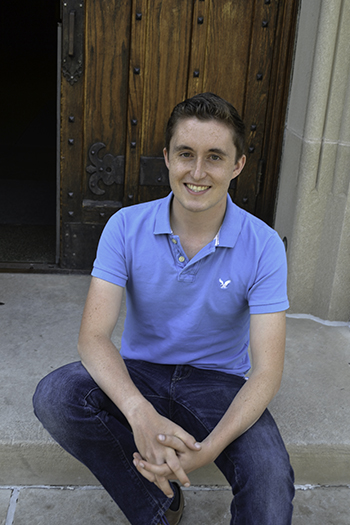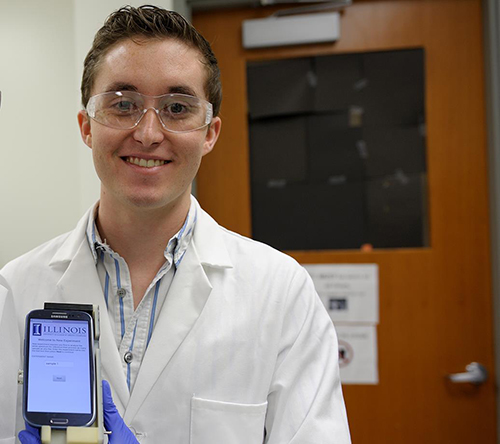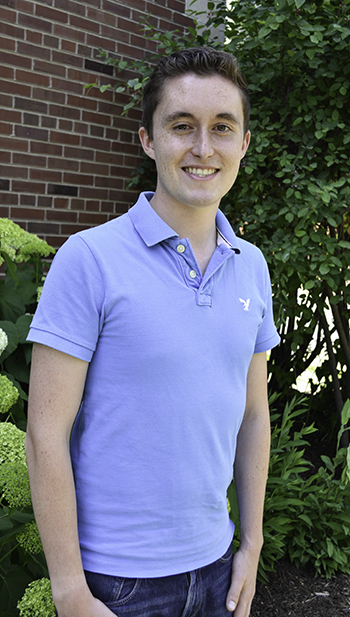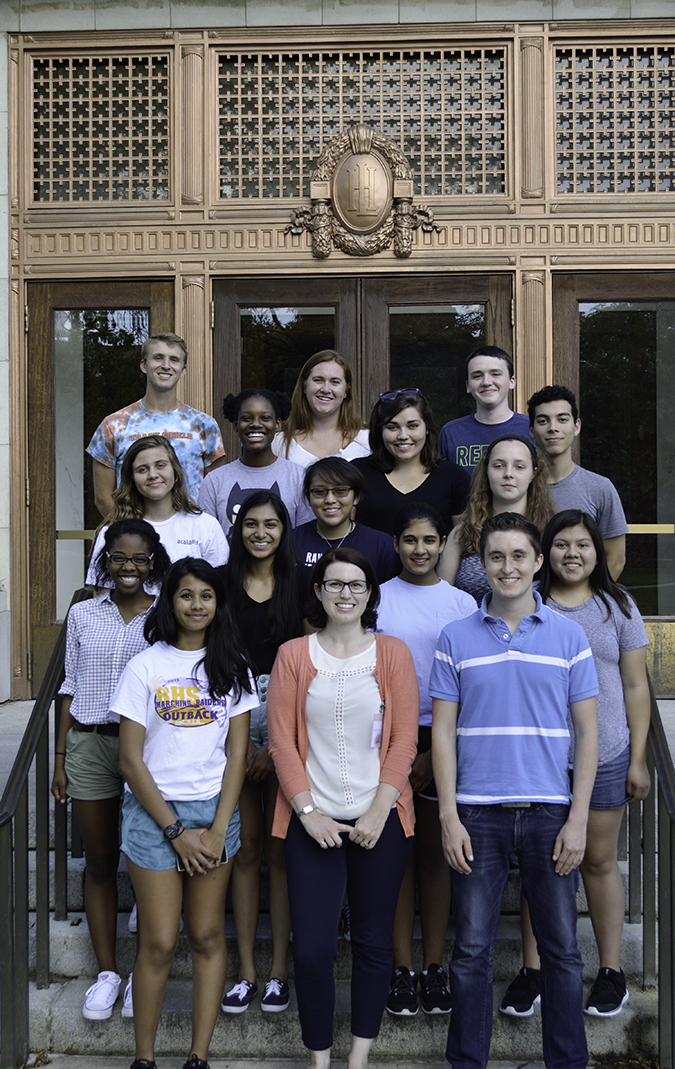Illinois’ Kenny Long and the Global Health Initiative Promote Global Health

Illinois MD PhD student Kenny Long, on the steps in front of the University YMCA.
September 27, 2016
For Illinois Engineering student Kenny Long, just being an engineer wasn’t enough. He wanted to approach problem-solving with a more interdisciplinary, holistic approach— not just fix a community’s impure water supply, but solve some of the residents’ medical issues related to having drunk the water. And just solving problems in his immediate vicinity wasn’t enough either. Recognizing that ours is a global village, Long embraced his global citizenship and is now seeking to solve problems in some of the more distant reaches of our village. And one way Long is doing that is through the Global Health Initiative and its INSIGHT (Illinois-Njala Sustainable & Innovative Global Healthcare Technologies) program.
It was Long’s commitment to making a difference for people outside of his own neighborhood that led to his first trip beyond the borders of the U.S. He traveled to Cameroon in western Africa as a part of Engineering Without Borders to work on a water supply project. And that trip let to a significant shift in his career trajectory.
“One of the things I noticed over the three times I went was the need for a more holistic approach to development than just doing an engineering project.” Long recognized that solutions for many of the issues throughout much of the world would require people from different disciplines working together.
“It’s not just engineers who can fix it; its not just doctors…all these things work together to address the underlying issues of poverty and inequality and long complicated histories of weird political situations. It’s really complicated.”
At that point, Long decided that he wanted to focus more on human interaction: “I wanted more interaction with people than just being an engineer working for a company. I wanted a direct contact with people I was affecting.”
So he slowly transitioned his education to a more medical focus. He changed majors from electrical engineering to a biomaterials concentration in materials science engineering. He had actually begun work on a second degree in Molecular and Cellular Biology, when he decided to seek an MD PhD.
“This realm of being able to do research, but then translate it to directly and actually impact the lives of people in a very tangible way—that was what I wanted.”
What’s Long’s dream job? “Ok, so I really want the best of both worlds,” he admits. “I want to see patients, but I also want to do research.” He says he’d like to be in a large academic institution with a teaching hospital, researching fundamental technologies in his research lab while at the same time seeing patients in need of the technologies he’s developing.

Kenny Long and his device (photo courtesy of MNTL website).
Long says he wouldn’t be surprised if he ends up doing research on point-of-care diagnostics, which is what he’s doing for his PhD research.
And while Long likes to travel to other places in the world to help people, he’d also like to be able to help them without taking one step outside of his lab. So for the last couple of years, his research with Professor Brian Cunningham's Nano Sensors Group has involved working on cell-phone-based diagnostics. He says his lab has developed an attachment that slides onto the back of a smartphone and allows its user to do optical-based tests, or tests that would normally be run on a spectrometer.
Their gadget currently enables a broad spectrum of different tests. In fact, Long reports recently using it to do a demonstration related to allergens: “l looked at peanut allergens; I went to the store and got some cookies from Insomnia and tested them for cross-contamination from just being cooked in the same place.”
Long says the goal of their device would be to enable caregivers to do tests that could be “done in such a way that it doesn’t require the fundamental infrastructure that we’re dependent on here for those sorts of tests. So something that would be much more immediate, and something that would be much more applicable.” In other words, he'd like to create a device that even medical personnel in remote places of the world without access to a raft of expensive equipment would be able to use to make diagnoses on the spot.
Given Long’s interest in doing holistic development projects overseas, combined with his desire to impact people’s lives in a tangible way, it makes sense that when he heard about the Global Health Initiative (GHI) student organization, he got involved.
GHI had been formed in 2011 to unite the global health community at Illinois. The organization had received funding through a Graduate College Focal Point grant designed to stimulate new interdisciplinary research through collaborations among faculty and graduate students from multiple fields. With the grant, GHI had piloted a seminar series and an international observational experience in Cape Coast, Ghana, during the 2011–2012 academic year.
Long soon discovered some kindred spirits among the other MD PhD students who were involved with GHI at the time. Many had been to Ghana and, after the trip, felt they had discovered their niche. But they wanted to know, “Ok, what next? What do we do next?”
Long, who worked at the University YMCA, was aware that the Y was looking to expand its global engagement and had developed a funding initiative, so he apprised his group of the opportunity. So GHI’s next step was to submit a proposal to the University YMCA then to form a partnership with it. Long explains:
“The goal that we pitched was, ‘There’s no concerted push looking at global health from all these different disciplinary perspectives. There are lots of individuals, individual researchers doing fantastic research in the area of global health, but they don’t necessarily interface with each other. They’re located in different colleges, in different departments. So how do we fix that?'”
So the GHI proposed to survey existing campus partnerships with institutions overseas, to see if one of them would be right for an expansion in the area of global health. The idea was to coordinate activities around a location with a lot of infrastructure already in place and build up an interdisciplinary structure that these activities could be based on, so people could all go to the same location to do their own research.
“Just a lot of the logistics when you’re working with an international partner can be a barrier to entry for a lot of people here starting that from scratch,” Long admits.
And of the overseas partners mentioned during the survey, Long reports that Njala University in Sierra Leone “just really impressed us.”
So in February 2014 Long and some GHI colleagues visited Njala University. During their trip, which happened to coincide with Njala’s 50th anniversary celebration, they discovered some information which pretty much cemented their relationship with Njala. The university had actually been founded in partnership with Illinois back in 1964. “Which is really unique!” Long exclaims. “A long-standing relationship, and that was one of the things that really drew us to the partnership at that point in time. I mean, how do you compete with a history like that?”
Back in the late 60’s, Illinois had sent over personnel to Njala’s brand new campus. Some of the first faculty members at Njala, they taught there for several years and trained some of Njala’s first students. Many of this first crop of students actually came back to the US to get their PhD’s, and many came to Illinois.
However, this reciprocal relationship was interrupted by Sierra Leone’s civil war from 1991–2002.
Once the war ended, Njala’s vice chancellor reached out to Illinois, seeking to reestablish the relationship. One Illinois faculty member who answered the call, and has been key in rekindling the Illinois-Njala connection was the College of Agricultural, Consumer, and Environmental Sciences (ACES) Associate Professor Paul McNamara, who had established study-abroad and research opportunities programs there for Illinois students.
In addition to its past history with Illinois, some infrastructure improvements made Njala University even more appealing to the GHI team. Reorganized after the civil war, Njala had absorbed a couple of other institutions: a teacher’s college and an old British paramedical campus, which became their school of health sciences.
Sensing that it was the right opportunity to renew the Illinois-Njala partnership, the GHI team began recruiting some other Illinois folk, like Bioengineering’s Jenny Amos. Amos explains why she got involved. "I was brought in after the initial visit to Sierra Leone to explore partnerships that could involve engineering and specifically my experience with design. So since I have students designing medical products and working clinical environments, it seemed a good area for me to delve into. I’ve always kind of had an interest in global health."
Amos also felt the opportunity to design for low-income clients would be beneficial for her students.
"So I thought for Bioengineering, it would have a lot of benefits, because we tend to design with corporations, with really high-end products, and this would allow us to design for a low- resource setting, which I thought would bring a lot to our program.
SoLong, Amos, and several others visited Njala University for some preliminary conversations to discuss, “How can we make this happen, and what would it look like?
Long says they “met a lot—pretty much every day for a week straight, just meeting with faculty members in the school of Community Health Sciences to say, ‘Ok, you are interested in partnering with us; we are interested in partnering with you; let’s put together a proposal and see if we can get funding for these sorts of things.’ And so we really hammered it out together.”
As fate would have it, however, during that trip, Ebola and the Zika virus began to spread in Western Africa. Within a matter of weeks of their return to campus, university travel to Sierra Leone was no longer allowed.

Illinois MD PhD student Kenny Long.
So during that time period, the curriculum development conversation began in earnest among a core group of faculty members committed to putting together a new undergraduate Global Health Certificate program.
So this fall, Illinois is beginning a new program, the Global Health Initiative Certificate, that not only spans several disciplines/units across campus, including Bioengineering; ACES; the College of Veterinary Medicine; and the College of Education; it spans an ocean. Key to the program is a partnership with the University of Njala in Sierra Leone, whose community health faculty and students will be collaborating with Illinois faculty and students to provide students in both institutions a richer understanding of and experience in global health.
As part of this, INSIGHT (the Illinois-Njala Sustainable & Innovative Global Healthcare Technologies) program was established, which will encourage cross-institutional collaboration by students to target specific health problems prevalent in Sierra Leone then seek to solve them via the creation of innovative yet sustainable medical devices.
Regarding his and GHI’s efforts to promote interdisciplinary collaboration around the area of global health, Long says,
“Well, I think it’s a really important area, which on campus has not been; there’s been no effort to combine all these people from across campus, and to give them the space to have these conversations.”
Story by Elizabeth Innes, Communications Specialist, I-STEM Education Initiative.
For more related stories, see: 2016, Graduate STEM Outreach
For additional I-STEM articles about global health on campus, see:
- Global Health Initiative Promotes Global Health Dialogue, Undergrad Certificate Program
- Highschoolers Discover Global Health at CGS' First-Ever Global Health Camp

Camp Director Jenny Amos (center, front row) and her grad student assistant Kenny Long (right, front row), with several of the participants in the 2016 Global Health camp, one of the GHI's projects.













.jpg)
















